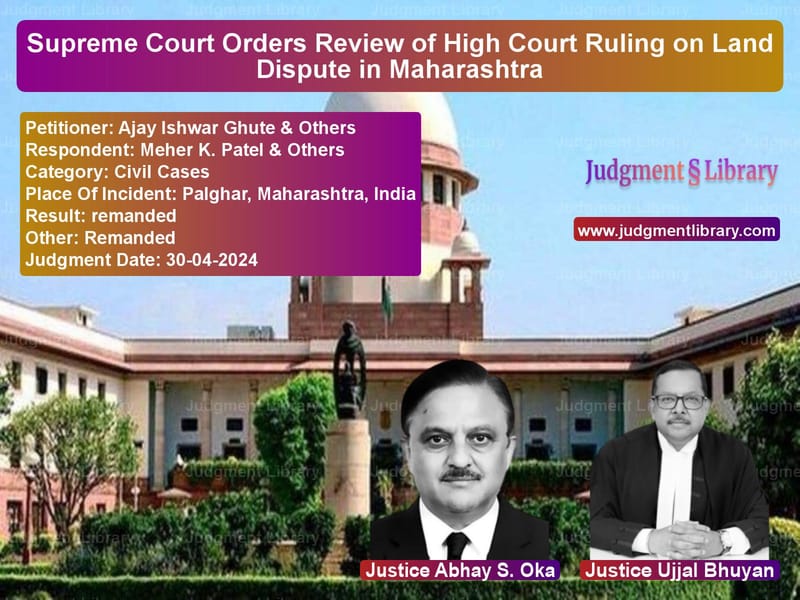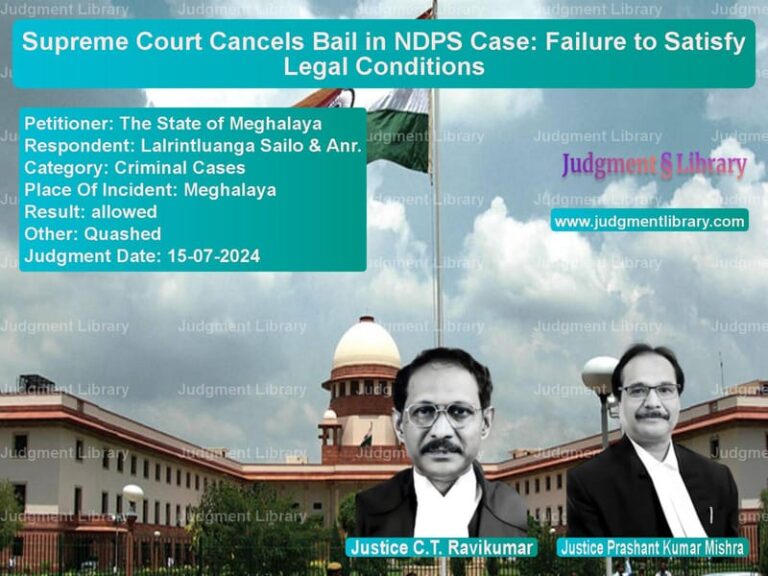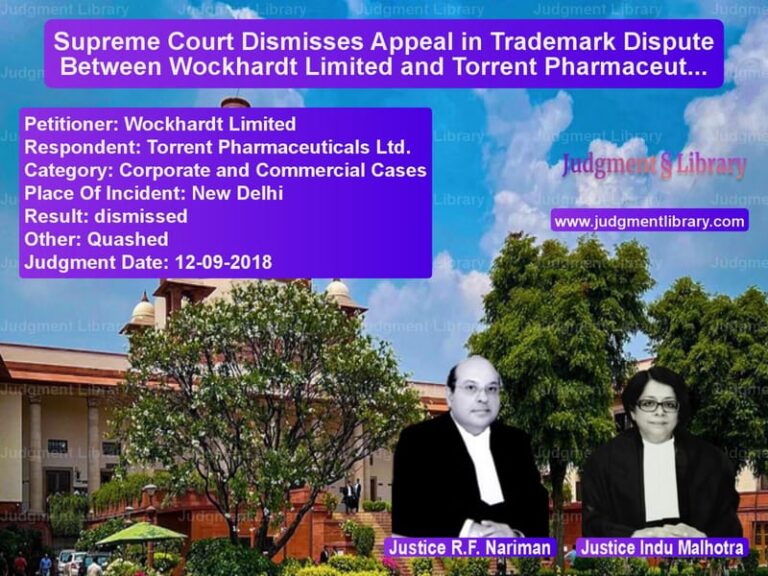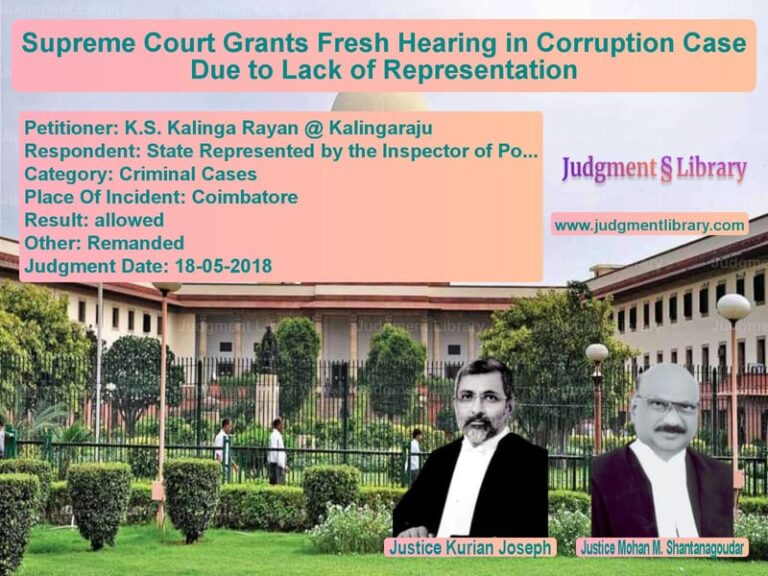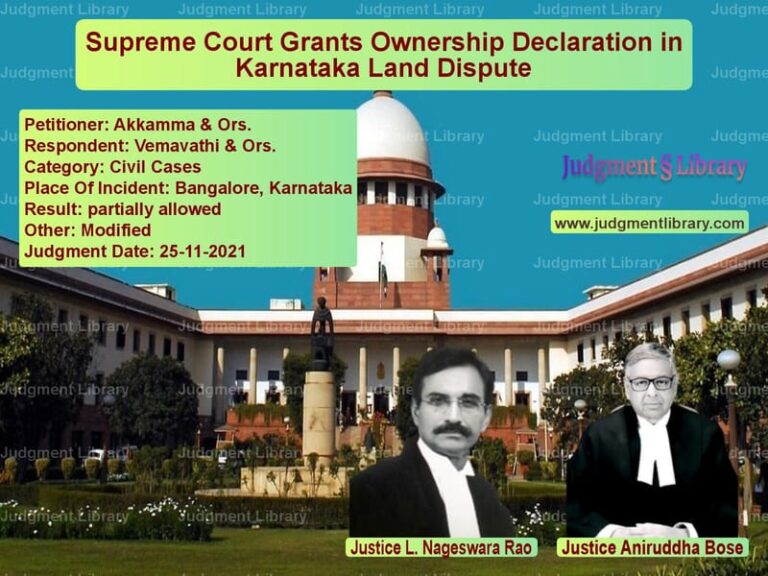Supreme Court Orders Review of High Court Ruling on Land Dispute in Maharashtra
The Supreme Court of India has set aside a Bombay High Court order allowing the construction of a compound wall on disputed land in Palghar, Maharashtra. The case, Ajay Ishwar Ghute & Others vs. Meher K. Patel & Others, questioned whether the High Court was justified in issuing such an order under its writ jurisdiction, especially when third-party landowners were likely to be affected.
Background of the Case
The dispute involved land belonging to the Parsi Dairy Farm in Varvada, Taluka Talasari, District Palghar. Arbitration proceedings concerning this land had led to a consent order in 2018, which included provisions for the construction of a compound wall. However, local residents and landowners objected to the wall’s construction, claiming it would block their access to their own properties.
Despite these objections, the Bombay High Court permitted the construction under police protection through an order issued on March 16, 2022. The order was based on “Minutes of Order” submitted by the parties’ lawyers rather than a detailed judicial ruling. The affected landowners, who had not been made parties to the case, later filed a review petition, which was rejected on July 20, 2023. This led to the present appeal before the Supreme Court.
Legal Issues Considered
The Supreme Court examined the following key issues:
- Whether the High Court erred in allowing the construction without hearing affected landowners.
- Whether the “Minutes of Order” practice used by the Bombay High Court was appropriate in this case.
- Whether the police protection granted for the construction was justified.
- Whether the review petition was wrongly dismissed without proper consideration of third-party rights.
Arguments by the Appellants (Ajay Ishwar Ghute & Others)
- The High Court order violated principles of natural justice as the affected landowners were not made parties to the case.
- The construction of the wall would landlock properties belonging to the local tribals.
- The High Court should have ordered a survey and verified land ownership before allowing construction.
- The “Minutes of Order” procedure was inappropriate as it lacked judicial reasoning.
- The review petition was dismissed without addressing these serious concerns.
Arguments by the Respondents (Meher K. Patel & Others)
- The compound wall was necessary to protect the disputed property.
- The order was passed in compliance with previous arbitration proceedings.
- The construction was carried out in a way that ensured access to all legitimate landowners.
- The objections raised were politically motivated and aimed at delaying the project.
Supreme Court’s Judgment
The Supreme Court ruled in favor of the appellants, finding the High Court’s decision flawed for multiple reasons.
1. Violation of Natural Justice
- The Supreme Court held that third-party landowners were not given an opportunity to present their case, making the High Court’s decision unfair.
- “No one can be deprived of their right to access land without due process of law,” the Court emphasized.
2. Improper Use of “Minutes of Order”
- The Court criticized the reliance on “Minutes of Order,” which lacked judicial scrutiny.
- “The High Court failed to examine whether all affected parties were represented before passing the order,” the Court observed.
3. Police Protection Order Was Unjustified
- The Court found no compelling reason to provide police protection for the construction.
- It held that law enforcement should not be used to enforce disputed claims without proper legal adjudication.
4. Remand to High Court for Fresh Hearing
- The Supreme Court set aside the High Court orders dated March 16, 2022 and July 20, 2023.
- The case was remanded to the Bombay High Court with instructions to implead all affected landowners and conduct a fresh hearing.
- “If the High Court finds that necessary parties were not impleaded, it may order the restoration of status quo ante, including demolition of the wall if required,” the Court ruled.
Legal Implications of the Judgment
This ruling has significant implications for property disputes:
- Ensuring Due Process: Courts must hear all affected parties before making orders affecting property rights.
- Judicial Scrutiny Over Procedural Shortcuts: The judgment discourages overreliance on “Minutes of Order” without proper reasoning.
- Limitations on Police Protection in Civil Disputes: Police should not be used to enforce contested claims without a final court ruling.
Conclusion
The Supreme Court’s ruling in Ajay Ishwar Ghute & Others vs. Meher K. Patel & Others upholds the principle that judicial decisions must be based on thorough legal scrutiny. By setting aside the High Court’s order, the Court has reinforced the importance of fair hearing and procedural integrity in land disputes.
Petitioner Name: Ajay Ishwar Ghute & Others.Respondent Name: Meher K. Patel & Others.Judgment By: Justice Abhay S. Oka, Justice Ujjal Bhuyan.Place Of Incident: Palghar, Maharashtra, India.Judgment Date: 30-04-2024.
Don’t miss out on the full details! Download the complete judgment in PDF format below and gain valuable insights instantly!
Download Judgment: ajay-ishwar-ghute-&-vs-meher-k.-patel-&-oth-supreme-court-of-india-judgment-dated-30-04-2024.pdf
Directly Download Judgment: Directly download this Judgment
See all petitions in Property Disputes
See all petitions in Landlord-Tenant Disputes
See all petitions in Contract Disputes
See all petitions in Judgment by Abhay S. Oka
See all petitions in Judgment by Ujjal Bhuyan
See all petitions in Remanded
See all petitions in Remanded
See all petitions in supreme court of India judgments April 2024
See all petitions in 2024 judgments
See all posts in Civil Cases Category
See all allowed petitions in Civil Cases Category
See all Dismissed petitions in Civil Cases Category
See all partially allowed petitions in Civil Cases Category

